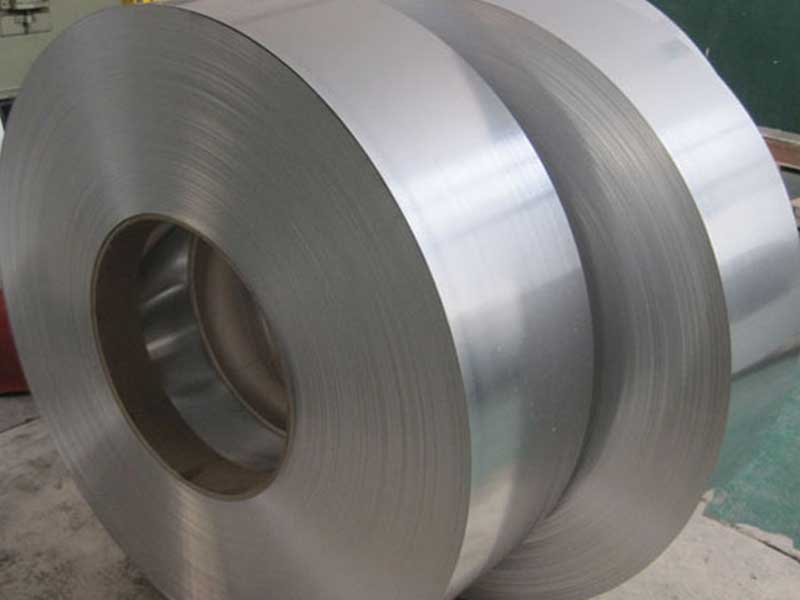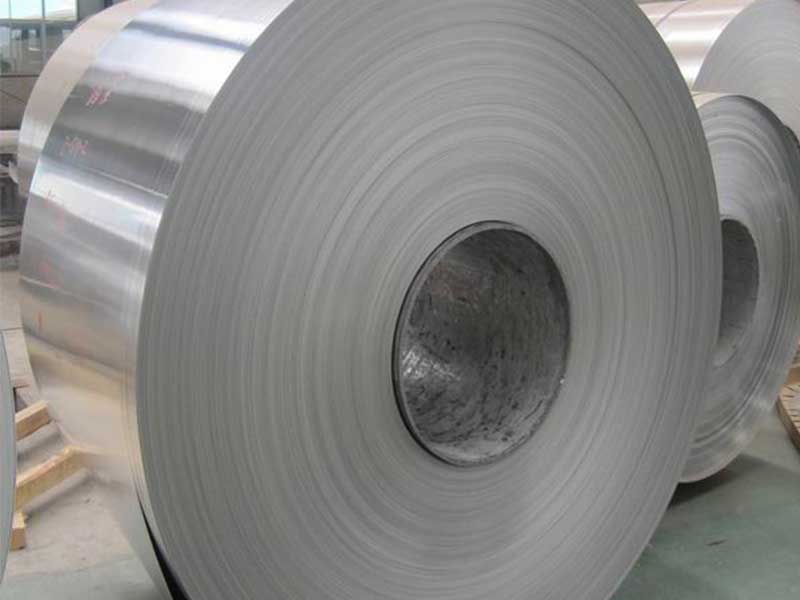1050 1060 3003 Aluminum Strip Coil
Aluminum strip coil is cold-rolled aluminum supplied in coils with controlled thickness and width for downstream processing (cutting, slitting, stamping, forming, brazing, welding). The alloys covered here are widely used non-heat-treatable alloys:
- 1050 and 1060: Commercially pure aluminum (Al ≥ 99.5% and ≥ 99.6% respectively). High electrical and thermal conductivity, excellent corrosion resistance, good formability and weldability. Lower strength compared with alloyed grades.
- 3003: Aluminum–manganese alloy (approx. 1.0–1.5% Mn). Improved strength over pure grades with good formability and corrosion resistance. Common general-purpose alloy for cookware, HVAC, chemical equipment and more.
These alloys are ideal where formability, corrosion resistance, surface quality and conductivity are important and where high strength is not the primary requirement.
Features
- Excellent formability and ductility (particularly 1050/1060).
- High corrosion resistance in many environments.
- Good thermal and electrical conductivity (exceptionally high for 1050/1060).
- Good surface finish for anodizing, painting, laminating and decorative uses.
- Weldable with common aluminum processes (TIG, MIG, resistance).
- Recyclable and lightweight.
- Available in multiple tempers (O, H12, H14, H24, H18, H22, etc.) and surface treatments.
- Wide range of thicknesses and widths, produced to tight tolerances suitable for slitting and stamping operations.
Typical Chemical Composition
All percentages are by weight. Minimums and maximums reflect common standards (EN, ASTM) — verify specific mill certificates for contract requirements.
| Element | 1050 (wt%) | 1060 (wt%) | 3003 (wt%) |
|---|---|---|---|
| Al (balance) | ≥ 99.5 | ≥ 99.6 | 96.7–99.0 |
| Si | 0.25 max | 0.25 max | 0.6 max |
| Fe | 0.40 max | 0.35 max | 0.7 max |
| Cu | 0.05 max | 0.05 max | 0.10–0.20 |
| Mn | 0.05 max | 0.05 max | 1.0–1.5 |
| Zn | 0.05 max | 0.05 max | 0.25 max |
| Ti | 0.03 max | 0.03 max | 0.15 max |
| V, Cr, Ni, etc. | 0.05 max (each) | 0.05 max (each) | 0.05 max (each) |
Notes:
- 1060 has slightly higher minimum Al content than 1050 and thus marginally higher conductivity.
- 3003 intentionally contains Mn to increase strength compared with 1xxx series.
Typical Mechanical Properties by Temper
Values shown are typical ranges. Confirm actual mill test reports for contract acceptance.
| Property | Alloy | Temper | Tensile Strength (MPa) | Yield Strength 0.2% (MPa) | Elongation (%) |
|---|---|---|---|---|---|
| 1050 | 1050 | O (annealed) | 40–65 | 20–35 | 30–45 |
| 1050 | 1050 | H14 | 65–95 | 40–70 | 10–20 |
| 1060 | 1060 | O | 40–70 | 20–35 | 30–45 |
| 1060 | 1060 | H14 | 65–100 | 40–75 | 8–18 |
| 3003 | 3003 | O | 75–115 | 35–60 | 20–35 |
| 3003 | 3003 | H14/H24 | 115–160 | 60–110 | 6–18 |
Notes:
- 1xxx alloys (1050/1060) are softer and more ductile than 3xxx (3003).
- Tempers H14, H24 etc. indicate work-hardening and partial strain hardening; tensile/yield vary by degree of cold work.
Physical Properties
| Property | 1050 | 1060 | 3003 |
|---|---|---|---|
| Density (g/cm³) | 2.71 | 2.71 | 2.73 |
| Electrical Conductivity (% IACS) | ~61–64% | ~62–65% | ~40–50% |
| Thermal Conductivity (W/m·K) | ~220 | ~230 | ~150 |
| Melting Range (°C) | 650–660 | 650–660 | 645–655 |
| Modulus of Elasticity (GPa) | 69 | 69 | 69 |
Standard Thickness & Width Range (Typical)
| Parameter | Typical Range |
|---|---|
| Thickness | 0.10 mm — 3.00 mm (common: 0.15, 0.2, 0.3, 0.5, 1.0 mm) |
| Width | 10 mm — 1600 mm (common slitted widths 8–1000 mm) |
| Coil ID (inner diameter) | 508 mm, 610 mm (other upon request) |
| Coil OD (max) | 1200–1400 mm depending on thickness & weight |
| Coil Weight | 100 kg — 6000 kg (per customer/plant capability) |
Surface Finishes & Treatments
- Mill finish (as-rolled, natural): Suitable for most forming and electrical applications.
- Bright annealed: Enhanced surface brightness for decorative parts and improved formability.
- Mechanical polishing and brushing: For aesthetic finishes (hairline, mirror).
- Anodizing: Good for protective decorative coatings; 1xxx and 3xxx behave differently (1xxx yields uniform anodic film; 3003 may show slight color variation due to alloying elements).
- Coating/painting: Pre-treatment (degrease, conversion coat) recommended.
- Laminated with plastic or film for packaging applications.
Fabrication & Processing
- Cold forming: Excellent bendability and deep draw for 1050/1060; 3003 offers higher strength with good drawability.
- Stamping & punching: Good, but tooling must account for burr formation and springback depending on temper.
- Welding: TIG/MIG/Resistance welding compatible. For 3003, filler metals should match or be suitable aluminum grades.
- Brazing: Compatible when appropriate fluxes and procedures are used; 1xxx alloys are readily brazeable.
- Cutting/slitting: Tight tolerances achievable; slitting burr control and edge trim quality important.
- Heat treatment: These alloys are non-heat-treatable for strength improvement; annealing is used to soften and restore ductility.
Tolerances (Typical, subject to mill standard)
| Dimension | Typical Tolerance |
|---|---|
| Thickness (≤0.5 mm) | ±0.02 mm |
| Thickness (0.5–1.0 mm) | ±0.03 mm |
| Thickness (>1.0–2.0 mm) | ±0.05 mm |
| Width | ±0.5–1.0 mm (narrow widths tighter) |
| Flatness | Specified per coil/customer requirement |
| Edge burr | ≤ specified mm per slitting spec |
Quality & Testing
Common inspection and testing procedures performed by reputable mills:
- Chemical analysis (OES/ICP) for certificate of analysis.
- Mechanical testing (tensile, yield, elongation).
- Surface inspection (visual, satin/bright).
- Dimensional checks (thickness, width, coil weight).
- Conductivity testing for electrical grades.
- Non-destructive testing for surface defects (eddy current, fluorescent).
- Packing inspection for export requirements (waterproof wrapping, wooden or steel pallets/crates).
Typical Applications
1050 and 1060:
- Electrical cables and conductors (busbars, transformer foils).
- Heat exchangers and thermal management components.
- Packaging foil and laminated packaging (when very thin).
- Reflective surfaces and light housings.
- Chemical & food handling equipment where high purity is required.
- Architectural trims and lightweight decorative components.
3003:
- Kitchenware and cookware (pots, pans, utensils).
- Domestic and commercial HVAC ducts and components.
- Fuel tanks (non-structural), chemical storage equipment.
- Roofing and cladding in non-structural applications.
- Baking trays, steam table pans, and food-contact surfaces.
- Pressure vessels (non-high-pressure) and general fabrication where higher strength than pure Al is needed.
Advantages & Limitations
Advantages:
- Lightweight, corrosion resistant and recyclable.
- Excellent formability for complex shapes.
- Wide availability and cost-effective for many industrial uses.
- Good electrical and thermal conductivity (especially 1xxx series).
Limitations:
- Lower strength compared with heat-treatable alloys (2xxx, 6xxx, 7xxx).
- May require surface protection (painting/anodizing) for aggressive environments.
- 3003 contains manganese which can slightly reduce electrical conductivity relative to pure alloys.
Ordering Considerations
When specifying or ordering, include:
- Alloy (1050, 1060, 3003)
- Temper (O, H14, H18, H24, etc.)
- Thickness and width (include tolerances)
- Surface finish (mill, bright annealed, anodized, coated)
- Coil ID/OD, maximum coil weight
- Certification requirements (EN10204 2.1/3.1, chemical and mechanical TO)
- Packing and shipping instructions
- Special processing (slitting, cutting-to-length, edge conditioning)
Example Specification (sample order line)
| Field | Example |
|---|---|
| Alloy | 3003 |
| Temper | H14 |
| Thickness | 0.8 mm ±0.03 mm |
| Width | 600 mm ±0.8 mm |
| Surface | Mill finish, bright annealed on request |
| Coil ID | 508 mm |
| Coil Weight | 2000 kg |
| Certification | EN10204 3.1 chemical + mechanical test report |
1050, 1060 and 3003 aluminum strip coils are versatile materials serving a broad range of industries. The 1xxx series (1050/1060) provides excellent conductivity and formability where high purity is required, while 3003 offers higher strength with still-good formability and corrosion resistance. Proper specification of temper, thickness, surface finish, and processing leads to reliable performance in forming, welding, heat exchange, packaging and decorative applications.
For purchase or technical support, please provide the alloy, temper, required dimensions, surface finish and any testing/certification needs so we can deliver a conforming product and precise quotation.
https://www.al-alloy.com/a/1050-1060-3003-aluminum-strip-coil.html



